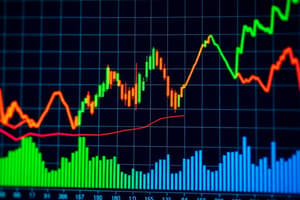Podcast
Questions and Answers
What is the primary subject of economics according to Alfred Marshall?
What is the primary subject of economics according to Alfred Marshall?
- Study of political systems
- Study of natural resources
- Study of technological advancements
- Study of man in the ordinary business of life (correct)
An employee is someone who provides goods and services to make a profit.
An employee is someone who provides goods and services to make a profit.
False (B)
What term is used to describe activities that are undertaken for monetary gain?
What term is used to describe activities that are undertaken for monetary gain?
Economic activities
When you buy goods to satisfy personal needs, you are known as a __________.
When you buy goods to satisfy personal needs, you are known as a __________.
Match the following roles in economics with their descriptions:
Match the following roles in economics with their descriptions:
What does scarcity in economics refer to?
What does scarcity in economics refer to?
If a person's income increases, they will always be able to fulfill all their wants.
If a person's income increases, they will always be able to fulfill all their wants.
Why is the study of economics important?
Why is the study of economics important?
The resources available for production in agriculture have __________ uses.
The resources available for production in agriculture have __________ uses.
Match the following economic terms with their definitions:
Match the following economic terms with their definitions:
Flashcards are hidden until you start studying
Study Notes
Introduction to Economics
- Economics studies human behavior in everyday life, focusing on activities of consumption, production, and distribution.
- Understanding of statistics is crucial for describing and analyzing these economic activities.
Why Economics?
- Economics relates to concepts presented by Alfred Marshall, emphasizing the ordinary business of life.
- Roles in the economy:
- Consumers: Individuals purchasing goods for personal needs or as gifts.
- Sellers: Individuals selling goods for profit, such as shopkeepers.
- Producers: Individuals or entities creating goods or services, like farmers or doctors.
- Employees: Individuals working for wages or salaries.
- Employers: Individuals providing jobs and wages to others.
Economic Activities
- Economic activities aim for monetary gain.
- Scarcity drives economic decisions – limited resources lead to choices in consumption and production.
- Limited pocket money exemplifies the necessity to choose priorities in spending.
Scarcity
- Scarcity is the core issue in economics, leading to various real-life challenges.
- Examples of scarcity:
- Long queues for services.
- Crowded public transport.
- Shortages of essential goods.
Resources and Choices
- Producers face limited resources with alternative uses, leading to a need for choice.
- Resources used for food production could also serve non-food production (e.g., rubber, cotton).
- The problem of choice arises from the limited availability of resources to satisfy competing wants.
Consumption, Production, and Distribution
- Economics is structured around understanding human engagement in various economic activities.
- Reliable data is essential to study production, consumption, and distribution effectively.
Studying That Suits You
Use AI to generate personalized quizzes and flashcards to suit your learning preferences.




